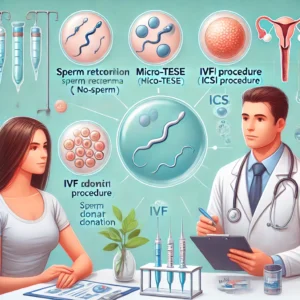
My sperm count is zero how to increase
My Sperm Count is Zero – How to Increase It? Having a zero sperm count, also known as azoospermia, can be a distressing condition for

Infertility can be a tough topic to talk about, especially when you or your partner face a diagnosis like zero sperm count. If you’ve ever wondered, “Can you have a baby with zero sperm count?” you’re not alone. Many couples have similar concerns, and modern medicine now offers several options to help make parenthood a reality.
In this guide, we will explain what zero sperm count means, why it happens, and the different ways to overcome it. We’ll discuss treatment options, lifestyle tips, and emotional support, and even share real-life stories—all in simple language. Let’s walk through this journey together.
When doctors talk about a “zero sperm count,” they are referring to a condition called azoospermia. This means that when a man’s semen is tested, no sperm are found. It might sound like the end of the road when you hear that, but there are ways to work around it.
Obstructive Azoospermia:
This happens when sperm are made in the testicles but get blocked from coming out in the semen. Think of it like water being blocked in a hose. Even though the water is there, it can’t flow through because of an obstruction. Causes of blockages might include:
Non-obstructive Azoospermia:
In this case, the testicles are not making enough sperm—or sometimes no sperm at all. This might happen because of:
Even if your semen shows zero sperm, many couples have still become parents using modern fertility treatments. Let’s look at the main ways to overcome this challenge.
Sometimes, even if no sperm is in the ejaculate, there might be sperm inside the testicles. Doctors can use special techniques to get these sperm out:
Testicular Sperm Extraction (TESE):
A small piece of testicle tissue is taken during a minor surgical procedure. In this tissue, doctors look for sperm that might not have made it to the ejaculate.
Percutaneous Epididymal Sperm Aspiration (PESA):
This method uses a thin needle to extract sperm from the epididymis, a tube that stores and carries sperm. It’s less invasive than TESE.
Microepididymal Sperm Aspiration (MESA):
Similar to PESA, but performed with a microscope for greater precision. This method is used when doctors need to carefully find and retrieve the few available sperm.
Once sperm are retrieved, they can be used to fertilize an egg.
Two popular methods to help couples overcome low or zero sperm count are:
In Vitro Fertilization (IVF):
IVF is a process where eggs are taken from the woman’s ovaries and fertilized with sperm in a lab. Once the fertilized egg (embryo) starts growing, it is transferred to the uterus. IVF can be done with sperm that were directly retrieved from the testicles.
Intracytoplasmic Sperm Injection (ICSI):
ICSI is a type of IVF. Here, a single sperm is injected directly into an egg. This method is especially useful when only a few sperm are available. ICSI makes it possible for fertilization to occur even when the sperm count is very low or zero in the ejaculate.
If retrieving sperm isn’t successful or if the couple feels more comfortable using another option, donor sperm is a well-established choice. Donor sperm is collected from a sperm bank or a trusted donor. It is then used in procedures like:
Using donor sperm helps many couples become parents when the male partner’s sperm count is a challenge.
Understanding the reasons behind a zero sperm count can help in deciding the right treatment. Here are some common causes explained in simple terms:
Some men have genetic conditions that affect sperm production. For example:
Certain infections can cause inflammation or blockages in the reproductive system. For instance:
The hormones in your body tell the testicles to produce sperm. If these hormones are out of balance—for example, low testosterone or problems with the pituitary gland—sperm production can be affected.
Sometimes, a blockage prevents sperm from leaving the body. This might happen due to:
Everyday choices can also have an impact:
It’s important to remember that having a zero sperm count doesn’t mean the end of your dream to have a baby. Here are some practical options and tips to consider:
Consult a Specialist:
If you suspect or have been diagnosed with azoospermia, the first step is to see a fertility specialist. They can run tests, determine the type of azoospermia, and suggest the best treatment options.
Sperm Retrieval Procedures:
Even if your semen analysis shows no sperm, methods like TESE or PESA might still be able to find viable sperm.
IVF and ICSI:
These are common procedures that have helped many couples. Your doctor can explain which method is best for you based on your specific situation.
Donor Sperm:
For some couples, donor sperm is a great way to achieve pregnancy. This option is completely normal and has helped many families grow.
Can you have a baby with zero sperm count? Even if you have a zero sperm count, adopting a healthier lifestyle can sometimes improve your overall fertility and the success of treatments:
Eat a Healthy Diet:
Foods rich in vitamins and minerals—like fruits, vegetables, and lean proteins—support overall health, including reproductive health.
Exercise Regularly:
Moderate exercise can help balance hormones and maintain a healthy weight. Just be sure not to overdo it, as extreme exercise can have the opposite effect.
Avoid Toxins:
Try to avoid exposure to harmful chemicals and toxins. This might mean switching to organic produce or using protective gear if you work in a high-risk environment.
Manage Stress:
Stress can negatively impact fertility. Consider activities like yoga, meditation, or even talking to a therapist to help manage stress.
Finding out you have a fertility issue can be very emotional. It’s normal to feel upset, confused, or even isolated. Here are some ways to get support:
Talk to Someone:
Sharing your feelings with a trusted friend, family member, or counselor can help you cope with the emotional challenges.
Join a Support Group:
Many communities and online groups are dedicated to helping people going through similar experiences. Hearing other people’s stories and advice can be very comforting.
Couples Counseling:
Sometimes, both partners can feel the stress of infertility. Couples counseling can help you communicate better and work as a team through this challenging time.
It might help to know that many couples have faced similar challenges and have successfully become parents. Here are two simple stories that show how hope and persistence can pay off:
Story 1:
John and Lisa had been trying to conceive for years. When tests showed John had zero sperm count, they felt lost. After consulting with a specialist, John underwent a TESE procedure. Even though the procedure found only a few sperm, they used ICSI during IVF. Today, they are the proud parents of a beautiful baby girl.
Story 2:
Can you have a baby with zero sperm count? Mike and Sara had always dreamed of having children. When they discovered Mike’s azoospermia, they explored every option. After several discussions, they chose to use donor sperm. With the help of a caring fertility clinic, Sara conceived and now enjoys life as a mom to a healthy baby boy.
Q: What is a zero sperm count?
A: A zero sperm count means that no sperm is found in the semen. This condition is called azoospermia.
Q: Does a zero sperm count mean I cannot have a biological child?
A: Not necessarily. Even if no sperm are seen in the ejaculate, doctors can sometimes find sperm directly from the testicles. Techniques like TESE and PESA, along with IVF and ICSI, make it possible for many couples to have a biological child.
Q: What causes azoospermia?
A: Azoospermia can be caused by blockages (obstructive) or issues with sperm production (non-obstructive). Factors include genetic conditions, infections, hormonal imbalances, and lifestyle choices.
Q: Can changing my lifestyle help?
A: While lifestyle changes might not completely reverse azoospermia, they can improve overall reproductive health and support the success of fertility treatments.
Q: What are my treatment options?
A: Your options include surgical sperm retrieval, IVF/ICSI, and, in some cases, using donor sperm. Your fertility specialist will help decide the best approach based on your specific condition.
Q: How do I know which treatment is right for me?
A: A thorough evaluation by a fertility specialist—including blood tests, semen analysis, and sometimes genetic testing—will help determine the cause of azoospermia and the most appropriate treatment plan.
Dealing with infertility is challenging, but it’s important to remember that you have options. Medical advancements have made it possible for many couples to overcome obstacles like zero sperm count. Whether through retrieving hidden sperm from the testicles or using modern techniques like IVF and ICSI, there is hope.
It’s also okay to feel a range of emotions as you navigate this journey. The key is to find support, gather information, and work with professionals who understand your unique situation. Remember, you are not alone—many people have walked this path and found a way to build their families.
If you’ve been diagnosed with azoospermia or are concerned about your fertility, take comfort in knowing that a zero sperm count does not close the door to parenthood. With the help of specialists, modern treatments, and supportive communities, you can explore the best options for your family.
Here are some friendly tips to help you stay positive and proactive:

My Sperm Count is Zero – How to Increase It? Having a zero sperm count, also known as azoospermia, can be a distressing condition for

My Husband Has No Sperm – How Can I Get Pregnant? My husband has no sperm – how can I get pregnant? Discovering that your

Prolistem, a patented formula, has not been evaluated by the Food and Drug Administration. This product is not intended to diagnose, treat, cure, or prevent any disease.
Copyright © 2025 Prolistem®
Prolistem, a patented formula, has not been evaluated by the Food and Drug Administration. This product is not intended to diagnose, treat, cure, or prevent any disease.
Copyright © 2023 Prolistem®